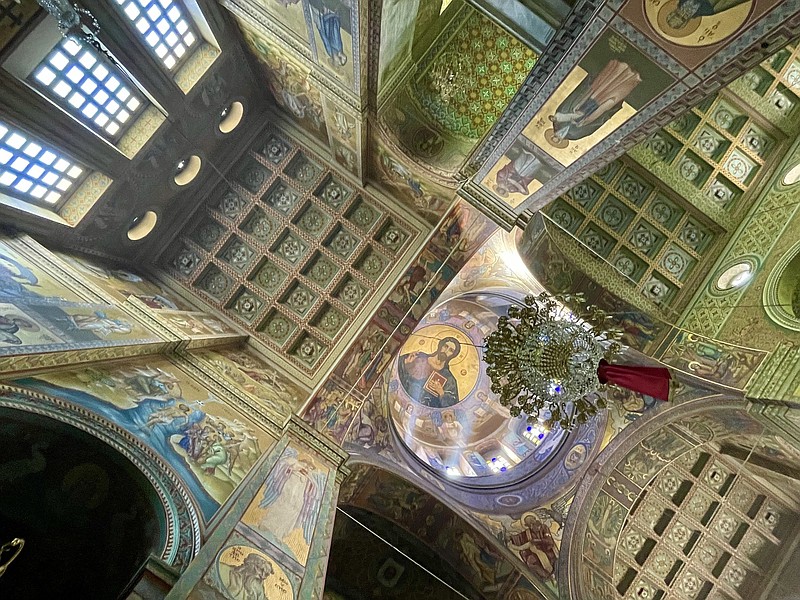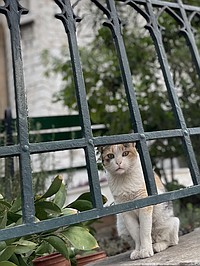ATHENS, Greece -- Atop the Acropolis, early Sunday, visitors beheld the Parthenon and the marvels of antiquity, but their ears heard bells, arising from the churches beneath them, throughout the morning.
The ruins above the city may be pagan, but the metropolis below is solidly Christian, Orthodox and Greek.
In a distant suburb, however, tired Harding University students, just back from retracing a portion of the Apostle Paul's Second Missionary Journey, were free to sleep in, if they chose.
Rather than rising at sunrise, they pray on Sundays at more conventional American Protestant hours.
The Searcy school, which is affiliated with the Churches of Christ, has had a campus near Athens since 1994, according to Harding University in Greece Director Daniel Adams.
It had operated, year after year, until covid-19 erupted in spring 2020.
"The day they declared it a pandemic, we sent everybody home. So we didn't have anybody for the rest of the spring, that summer, fall or this spring. This summer we restarted," Adams said.
[Gallery not loading above? Click here for more photos » arkansasonline.com/102greece/]
During the week, roughly 15 participants are studying modern Greek and a variety of other subjects in Porto Rafti, east of the capital city and near the Aegean Sea.
On average 25 students attend each semester, but with covid-19 still circulating, "Some people are still reticent to travel," Adams said.
Those who make the journey are able to glimpse the birthplace of western civilization.
For Harding students, in Greece and elsewhere, spiritual development is a priority.
"With all of our programs, it doesn't matter where they are, we always have a Bible class, whether it's back in Searcy or on the overseas programs, and daily chapel when we have class," Adams said as he strolled down a cobblestone pathway near the Parthenon.
"With the Greece program, it's particularly relevant," he said.
Travel is a key element.
FOLLOWING JESUS
"We're very close to Israel and Egypt. We go to those places," Adams said. In Galilee and in Jerusalem, "we get to follow the footsteps of Jesus."
In Egypt, two hours from Athens by plane, "we're following early Jesus' life in Cairo," he said.
With King Herod killing infants, Mary and Joseph fled with their son to the land of the Pharaohs, the New Testament reports. According to church tradition, they lived for four years in Heliopolis -- Greek for "City of the Sun."
Later in the field trip, Adams said, "we do a Nile River cruise, look at all the ancient temples, [and] spend a good deal of time in Luxor, which is where Moses grew up."
Jesus never visited Athens, at least in the biblical accounts. But Greece and its language are prominently featured in the Acts of the Apostles and in the Epistles which follow.
Some of the earliest New Testament congregations sprung up near the Aegean coastline nearly 2,000 years ago, spreading along the major trade routes linking Jerusalem, Athens and Rome.
At the time, Greek was the language of commerce and culture, a legacy of Alexander the Great and others. It was also the language of the Gospels and the early church fathers.
FOLLOWING PAUL
The New Testament reports that Paul spent time in Athens, observing its religious practices and assessing its various deities.
While there, Paul's "spirit was stirred in him, when he saw the city wholly given to idolatry," Acts 17 states in the King James Version.
So the Apostle "disputed" with philosophers and Jews and other "devout persons" as well as those he met "in the market daily."
While in Greece, Harding students visit the Agora, site of the city's old marketplace.
And they climb the Aeropagus, sometimes referred to as Mars Hill, where Paul, according to the New Testament account, denounced the pagan shrines around him.
"God that made the world and all things therein, seeing that he is Lord of heaven and earth, dwelleth not in temples made with hands," he preached, urging listeners to "seek the Lord ... for in him we live, and move, and have our being."
Two millennia later, visitors to the Aeropagus (or "Rock of Ares") can read Paul's entire sermon in the original, somewhat archaic, Greek; it's inscribed on a plaque not far from the summit.
Sunday, with the sun overhead and the temperature rising, Adams offered to climb the hill, which his guest had previously visited, or to wander through the ancient Agora, old Athens' central marketplace and public square.
"In the Agora, there's shade," he noted, helpfully.
Paul would, no doubt, have strolled through the area, Adams said.
HELLENIC CULTURE
The Temple of Hephaestus, begun in 449 B.C., would have been a key landmark at the time. The shrine, which honors the god of fire and forge, remains standing today.
During the semester-long program, students visit the city's key sites and learn about Hellenic culture. They also attend at least one Orthodox service.
"Usually, we go to a little church in [a suburb called] Markopoulo," he said. "We'll walk inside and go up in the balcony and watch. That way we can see everything that's going on ... [without] being a disruption."
The service, in its entirety, can last three hours, though worshippers sometimes come and go midservice, he said. Churches of Christ gatherings are typically somewhat shorter.
Greek Orthodox natives and the Arkansas Protestant transplants come from distant continents and speak separate tongues. Their doctrinal beliefs differ and their liturgical traditions diverge.
But this much they share. Each Sunday, they commemorate the crucifixion and resurrection of Jesus Christ.
Neither tradition has embraced pipe organs or pianos, let alone electric guitars and tambourines. The music is a cappella.
HOUSES OF WORSHIP
Athens' grandest Orthodox houses of worship are ornate.
A few are surrounded by gardens. Grapes grow plump and pomegranates ripen, figs can be pilfered and citrus plucked.
The Glyfada Church of Christ sanctuary, on the other hand, is simple and stripped of nearly all ornamentation. There are no bells to ring, no domes that dazzle, no icons to kiss or incense that smolders.
From the Acropolis station, it's only nine stops to the Elliniko subway stop, and another two-minute walk to the church.
The morning service there, traditionally, is in Greek, with evening services in English and Farsi.
The primary sign, near the entranceway, is black and white and plain as a manila envelope.
The word for church -- "ekklesia" -- and the English word "ecclesiastical" are related.
A smaller sign on the side lists service times in Greek as well as English, noting that "Everyone is welcome."
The minister, Dino Roussos, is the son of Anthony Roussos, a friend and former translator for George Dumas, the first Church of Christ missionary in Greece.
His daughter, Natalie, is a Harding University graduate, he noted Sunday, and he has warmly welcomed its students and teachers over the years.
"We love Harding and we love Arkansas. It's a great place," he said.
THE SERVICE
When congregants gathered Sunday to pray -- socially distanced and properly masked -- they sat in chairs instead of pews and sang songs that Searcy churchgoers would likely recognize. Roughly two dozen met, about as many as covid-19 restrictions would allow.
The worshippers included Emma Eichhorn, a Harding University graduate who majored in education and minored in Bible missions. After finishing school, she volunteered at a refugee camp on the isle of Lesbos, distributing clothing to survivors of the Syrian civil war.
Now 26, she helps people improve their English-language skills. After covid-19 closed the country's schools, she home-schooled three Iraqi children.
"Witnessing the Gospel," is currently Eichhorn's "free-time activity," not her job, she said. But in her heart, it's her top priority, she added.
Inside the storefront sanctuary, there were a few candles, but they remained unkindled, resting beneath a modern back-lit cross.
The entire congregation, a mixture of students, American expatriates, vacationers and converts, sang "My Jesus I Love Thee," robustly and in English. Later, more tentatively, they attempted to sing "Amazing Grace" in Greek.
Tim Tripp, senior minister at West Side Church of Christ in Russellville, delivered the message Sunday evening, reading from one of Paul's letters to the church in Corinth, a town "just down the road" from Glyfada, he noted. The city, along with Mars Hill, were on his Greek itinerary.
"It's a great experience," Tripp said after making the stops. "To see a place where Paul has been, it's touching. It's impactful," he said afterward. "It definitely firms it up. It's concrete that way."
Before closing, church leaders distributed small cups containing bread and grape juice, allowing each worshipper to partake.
(The Americans often refer to it as The Lord's Supper. The more common term, among the Orthodox, is the Eucharist, from the Greek word for "Thanksgiving" -- "eukharistia.")
Afterward, a Harding student spoke enthusiastically about his recent pilgrimage to Philippi, Thessaloniki and other places with New Testament churches; the Apostle Paul visited both cities during his missionary journeys.
"We've grown up reading about him or hearing about him, and it's just amazing [to be there]," said Dylan Holland, 19, a Bible and Family Ministry major from Fayetteville.
Thanks to Harding University in Greece, the dots on a New Testament study Bible map are no longer abstractions, he noted.
What he's learning, he believes, will help prepare him for future ministry.
"That was a driving factor for wanting to do this trip, getting to go to all these places that I'll someday be able to teach and preach about," he said.






